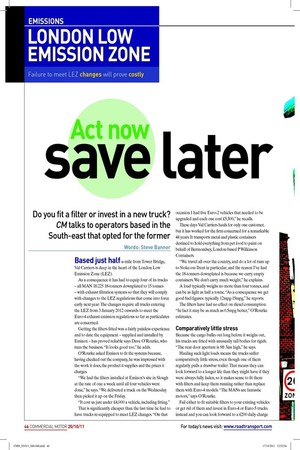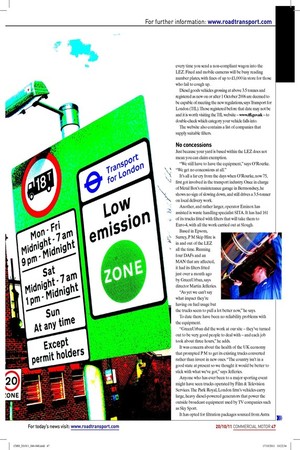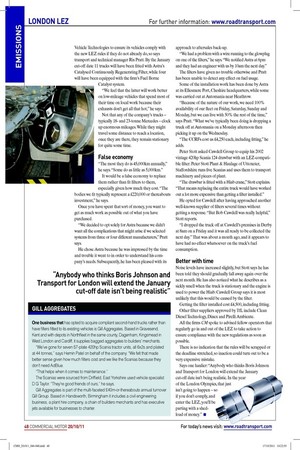Act now
Page 36

Page 37

Page 38

If you've noticed an error in this article please click here to report it so we can fix it.
save later
Do you fit a filter or invest in a new truck? CM talks to operators based in the South-east that opted for the former Words: Steve Banner Based just half-a-mile from Tower Bridge, Val Carriers is deep in the heart of the London Low Emission Zone (LEZ).
As a consequence it has had to equip four of its trucks – all MAN 18.225 18-tonners downplated to 15 tonnes – with exhaust iltration systems so that they will comply with changes to the LEZ regulations that come into force early next year. The changes require all trucks entering the LEZ from 3 January 2012 onwards to meet the Euro-4 exhaust emission regulations so far as particulates are concerned.
Getting the ilters itted was a fairly painless experience and to date the equipment – supplied and installed by Eminox – has proved reliable says Dave O’Rourke, who runs the business. “It looks good too,” he adds.
O’Rourke asked Eminox to it the systems because, having checked out the company, he was impressed with the work it does, the product it supplies and the prices it charges.
“We had the ilters installed at Eminox’s site in Slough at the rate of one a week until all four vehicles were done,” he says. “We delivered a truck on the Wednesday then picked it up on the Friday.
“It cost us just under £4,000 a vehicle, including itting.” That is signiicantly cheaper than the last time he had to have trucks re-equipped to meet LEZ changes. “On that occasion I had ive Euro-2 vehicles that needed to be upgraded and each one cost £5,500,” he recalls.
These days Val Carriers hauls for only one customer, but it has worked for the irm concerned for a remarkable 44 years. It transports metal and plastic containers destined to hold everything from pet food to paint on behalf of Bermondsey, London-based P Wilkinson Containers.
“We travel all over the country, and do a lot of runs up to Stoke-on-Trent in particular, and the reason I’ve had the 18-tonners downplated is because we carry empty containers. We don’t carry much weight,” he explains.
A load typically weighs no more than four tonnes, and can be as light as half a tonne. “As a consequence we get good fuel igures: typically 12mpg-15mpg,” he reports.
The ilters have had no effect on diesel consumption. “In fact it may be as much as 0.5mpg better,” O’Rourke estimates.
Comparatively little stress
Because the cargo bulks out long before it weighs out, his trucks are itted with unusually tall bodies for rigids. “The rear door aperture is 9ft 3ins high,” he says.
Hauling such light loads means the trucks suffer comparatively little stress, even though one of them regularly pulls a drawbar trailer. That means they can look forward to a longer life than they might have if they were always fully laden, so it makes sense to it them with ilters and keep them running rather than replace them with Euro-4 models. “The MANs are fantastic motors,” says O’Rourke.
Fail either to it suitable ilters to your existing vehicles or get rid of them and invest in Euro-4 or Euro-5 trucks instead and you can look forward to a £200 daily charge every time you send a non-compliant wagon into the LEZ. Fixed and mobile cameras will be busy reading number plates, with ines of up to £1,000 in store for those who fail to cough up.
Diesel goods vehicles grossing at above 3.5 tonnes and registered as new on or after 1 October 2006 are deemed to be capable of meeting the new regulations, says Transport for London (TfL). Those registered before that date may not be and it is worth visiting the TfL website – www.tl.gov.uk – to double-check which category your vehicle falls into.
The website also contains a list of companies that supply suitable ilters.
No concessions
Just because your yard is based within the LEZ does not mean you can claim exemption.
“We still have to have the equipment,” says O’Rourke. “We get no concessions at all.” It’s all a far cry from the days when O’Rourke, now 75, irst got involved in the transport industry. Once in charge of Metal Box’s maintenance garage in Bermondsey, he shows no sign of slowing down, and still drives a 3.5-tonner on local delivery work.
Another, and rather larger, operator Eminox has assisted is waste handling specialist SITA. It has had 161 of its trucks itted with ilters that will take them to Euro-4, with all the work carried out at Slough.
Based in Epsom, Surrey, P M Skip Hire is in and out of the LEZ all the time. Running four DAFs and an MAN that are affected, it had its ilters itted just over a month ago by GreenUrban, says director Martin Jefferies.
“As yet we can’t say what impact they’re having on fuel usage but the trucks seem to pull a lot better now,” he says.
To date there have been no reliability problems with the equipment.
“GreenUrban did the work at our site – they’ve turned out to be very good people to deal with – and each job took about three hours,” he adds.
It was concern about the health of the UK economy that prompted P M to get its existing trucks converted rather than invest in new ones. “The country isn’t in a good state at present so we thought it would be better to stick with what we’ve got,” says Jefferies.
Anyone who has ever been to a major sporting event might have seen trucks operated by Film & Television Services. The Park Royal, London irm’s vehicles carry large, heavy diesel-powered generators that power the outside broadcast equipment used by TV companies such as Sky Sport.
It has opted for iltration packages sourced from Astra Vehicle Technologies to ensure its vehicles comply with the new LEZ rules if they do not already do, so says transport and technical manager Ris Pratt. By the January cut-off date 11 trucks will have been itted with Astra’s Catalysed Continuously Regenerating Filter, while four will have been equipped with the irm’s Fuel Borne Catalyst system.
“We feel that the latter will work better on low-mileage vehicles that spend most of their time on local work because their exhausts don’t get all that hot,” he says.
Not that any of the company’s trucks – typically 18and 23-tonne Mercedes – clock up enormous mileages. While they might travel some distance to reach a location, once they are there, they remain stationary for quite some time.
False economy
“The most they do is 45,000km annually,” he says. “Some do as little as 5,000km.” It would be a false economy to replace them rather than it ilters to them, especially given how much they cost. “The bodies we it typically represent a £220,000 or thereabouts investment,” he says.
Once you have spent that sort of money, you want to get as much work as possible out of what you have purchased.
“We decided to opt solely for Astra because we didn’t want all the complications that might arise if we selected systems from three or four different manufacturers,” Pratt says.
He chose Astra because he was impressed by the time and trouble it went to in order to understand his company’s needs. Subsequently, he has been pleased with its approach to aftersales back-up.
“We had a problem with a wire running to the glowplug on one of the ilters,” he says. “We notiied Astra at 6pm and they had an engineer with us by 10am the next day.” The ilters have given no trouble otherwise and Pratt has been unable to detect any effect on fuel usage.
Some of the installation work has been done by Astra at its Ellesmere Port, Cheshire headquarters, while some was carried out at Automania near Heathrow.
“Because of the nature of our work, we need 100% availability of our leet on Friday, Saturday, Sunday and Monday, but we can live with 50% the rest of the time,” says Pratt. “What we’ve typically been doing is dropping a truck off at Automania on a Monday afternoon then picking it up on the Wednesday.
“The CCRFs cost us £4,250 each, including itting,” he adds.
Peter Stott asked Cawdell Group to equip his 2002 vintage 420hp Scania 124 drawbar with an LEZ-compatible ilter. Peter Stott Plant & Haulage of Uttoxeter, Staffordshire runs ive Scanias and uses them to transport machinery and pieces of plant.
“The drawbar is itted with a Hiab crane,” Stott explains. “That means replacing the entire truck would have worked out a lot more expensive than getting a ilter installed.” He opted for Cawdell after having approached another well-known supplier of ilters several times without getting a response. “But Bob Cawdell was really helpful,” Stott reports.
“I dropped the truck off at Cawdell’s premises in Derby at 8am on a Friday and it was all ready to be collected the next day.” That was about a month ago, and it appears to have had no effect whatsoever on the truck’s fuel consumption.
Better with time
Noise levels have increased slightly, but Stott says he has been told they should gradually fall away again over the next month. He has also noticed what he describes as a sickly smell when the truck is stationary and the engine is used to power the Hiab: Cawdell Group says it is most unlikely that this would be caused by the ilter.
Getting the ilter installed cost £4,500, including itting.
Other ilter suppliers approved by TfL include Clean Diesel Technology, Dinex and Pirelli Ambiente.
All the irms CM spoke to advised fellow operators that regularly go in and out of the LEZ to take action to ensure compliance with the new regulations as soon as possible.
There is no indication that the rules will be scrapped or the deadline stretched, so inaction could turn out to be a very expensive mistake.
Says one haulier: “Anybody who thinks Boris Johnson and Transport for London will extend the January cut-off date isn’t being realistic. In the year of the London Olympics, that just isn’t going to happen – so if you don’t comply, and enter the LEZ, you’ll be parting with a shed
load of money.” ■










































